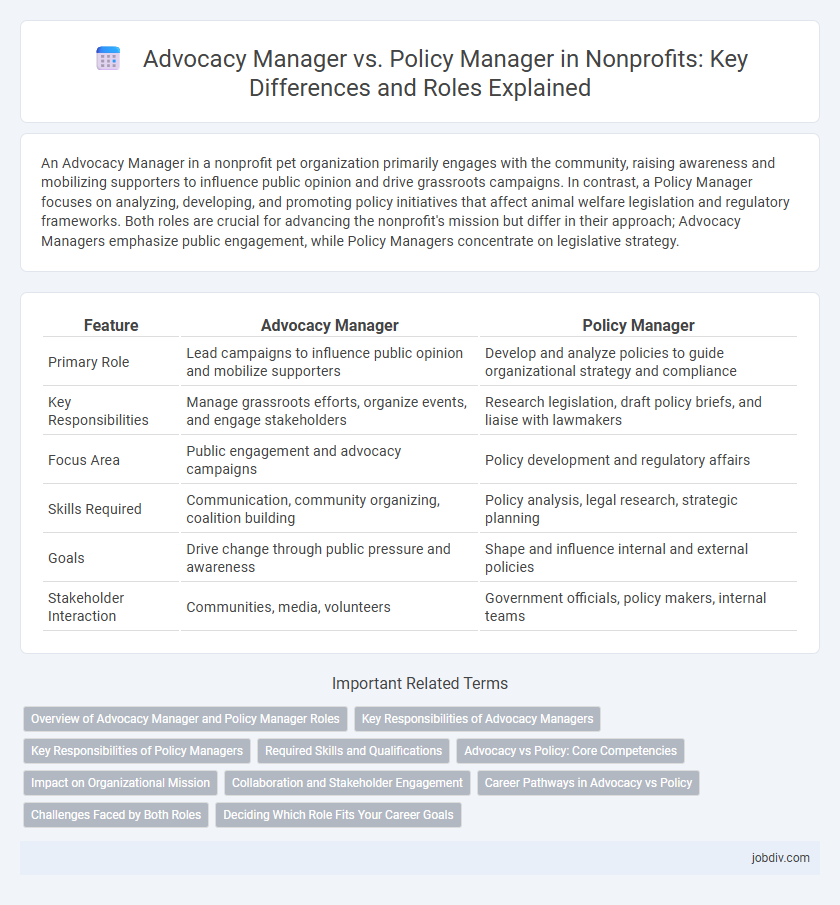An Advocacy Manager in a nonprofit pet organization primarily engages with the community, raising awareness and mobilizing supporters to influence public opinion and drive grassroots campaigns. In contrast, a Policy Manager focuses on analyzing, developing, and promoting policy initiatives that affect animal welfare legislation and regulatory frameworks. Both roles are crucial for advancing the nonprofit's mission but differ in their approach; Advocacy Managers emphasize public engagement, while Policy Managers concentrate on legislative strategy.
Table of Comparison
| Feature | Advocacy Manager | Policy Manager |
|---|---|---|
| Primary Role | Lead campaigns to influence public opinion and mobilize supporters | Develop and analyze policies to guide organizational strategy and compliance |
| Key Responsibilities | Manage grassroots efforts, organize events, and engage stakeholders | Research legislation, draft policy briefs, and liaise with lawmakers |
| Focus Area | Public engagement and advocacy campaigns | Policy development and regulatory affairs |
| Skills Required | Communication, community organizing, coalition building | Policy analysis, legal research, strategic planning |
| Goals | Drive change through public pressure and awareness | Shape and influence internal and external policies |
| Stakeholder Interaction | Communities, media, volunteers | Government officials, policy makers, internal teams |
Overview of Advocacy Manager and Policy Manager Roles
An Advocacy Manager drives public support and engagement by organizing campaigns, mobilizing volunteers, and communicating key messages to influence social change. A Policy Manager focuses on analyzing legislation, developing policy recommendations, and collaborating with stakeholders to shape regulatory frameworks. Both roles are pivotal in advancing a nonprofit's mission through strategic influence on public opinion and government policies.
Key Responsibilities of Advocacy Managers
Advocacy Managers lead strategic campaigns to influence public opinion and drive policy changes by mobilizing stakeholders and managing grassroots efforts. They focus on building coalitions, engaging with community members, and crafting compelling narratives to support the nonprofit's mission. Their responsibilities include organizing advocacy events, monitoring legislative developments, and coordinating communication between the organization and policymakers.
Key Responsibilities of Policy Managers
Policy Managers in nonprofits focus on researching, developing, and implementing legislative strategies to influence public policy aligned with the organization's mission. They analyze policy trends, draft position papers, and collaborate with stakeholders to advocate for regulatory changes. Their key responsibilities include monitoring government activities, building coalitions, and ensuring compliance with legal frameworks to advance social impact initiatives.
Required Skills and Qualifications
An Advocacy Manager requires strong communication, stakeholder engagement, and grassroots mobilization skills, with qualifications often including a background in public relations, communications, or social sciences. A Policy Manager needs expertise in policy analysis, legislative knowledge, and strategic planning, typically holding degrees in public policy, law, or political science. Both roles demand critical thinking, project management abilities, and experience in nonprofit or advocacy environments.
Advocacy vs Policy: Core Competencies
Advocacy Managers excel in community engagement, public speaking, and coalition-building to influence public opinion and mobilize grassroots support, while Policy Managers specialize in legislative analysis, regulatory development, and strategic planning to shape and implement organizational policy objectives. Advocacy focuses on persuasion and raising awareness through direct interaction with stakeholders, whereas policy emphasizes research, drafting, and navigating governmental procedures. Both roles require strong communication skills, but Advocacy Managers prioritize interpersonal influence, and Policy Managers prioritize analytical expertise and regulatory knowledge.
Impact on Organizational Mission
An Advocacy Manager drives public support and mobilizes stakeholders to influence policies that align with the nonprofit's mission, enhancing community engagement and visibility. A Policy Manager concentrates on analyzing, developing, and implementing policy initiatives that ensure organizational goals are met through effective legislation and regulatory frameworks. Both roles critically impact the organization's mission by shaping external environments and advancing strategic objectives through targeted advocacy and policy development.
Collaboration and Stakeholder Engagement
Advocacy Managers excel in building broad coalitions and engaging diverse community stakeholders to advance an organization's mission, leveraging grassroots mobilization and public awareness campaigns. Policy Managers focus on in-depth collaboration with government officials, legislative bodies, and expert analysts to shape and influence public policy through research and strategic recommendations. Both roles require effective communication and partnership skills, but Advocacy Managers prioritize external public engagement while Policy Managers emphasize internal policy development and regulatory compliance.
Career Pathways in Advocacy vs Policy
Advocacy Managers typically focus on grassroots mobilization, coalition building, and public engagement to drive social change, while Policy Managers concentrate on developing, analyzing, and influencing legislation and regulatory frameworks. Career pathways in advocacy often lead to roles in communications, campaign strategy, or community organizing, whereas policy careers advance toward government relations, legislative affairs, or think tank positions. Both paths require strong understanding of nonprofit operations, stakeholder management, and sector-specific expertise, but differ in emphasis on direct public interaction versus technical policy analysis.
Challenges Faced by Both Roles
Advocacy Managers and Policy Managers in nonprofits both encounter challenges such as navigating complex regulatory environments and influencing public opinion amid shifting political landscapes. Advocacy Managers often struggle with mobilizing grassroots support while maintaining message consistency, whereas Policy Managers face difficulties in translating advocacy goals into actionable policy proposals that satisfy diverse stakeholders. Both roles require balancing strategic communication with data-driven analysis to effectively drive legislative and social change.
Deciding Which Role Fits Your Career Goals
An Advocacy Manager primarily focuses on grassroots campaigns, public engagement, and mobilizing community support to influence policy outcomes, making it ideal for professionals passionate about direct activism and communication. A Policy Manager specializes in research, analysis, and crafting policy recommendations, suited for those interested in shaping legislation and strategic decision-making within nonprofit organizations. Choosing between these roles depends on whether your career goals align more with public influence and outreach or detailed policy development and advisory responsibilities.
Advocacy Manager vs Policy Manager Infographic

 jobdiv.com
jobdiv.com